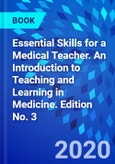- Provides hints drawn from practical experience that help you create powerful learning opportunities for your students, with readable guidelines and new techniques that can be adopted for use in any teaching program.
- Includes new coverage of "just-in-time" learning, entrustable professional activities, steps on introducing outcome/competency-based education, selecting a teaching method, programmatic assessment, self-assessment, the student and patient as partners in the education process, the changing role of the teacher, bringing about change, and the future of medical education.
- Covers recent developments in our understanding of the relationship between learning and technology, as well as curriculum planning and curriculum mapping.
- Offers practical advice from leading international expert Professor Ronald Harden and co-author Jennifer Laidlaw, who has designed and taught many courses for medical teachers.
- Prompts you to reflect on your own performance as an educator, as well as analyze with colleagues the different ways that your work can be approached and how your students' or trainees' learning can be made more effective.
- Expert ConsultT eBook version included with purchase. This enhanced eBook experience allows you to search all of the text, figures, and references from the book on a variety of devices.
Significant developments will be highlighted throughout this revised edition including the case for 'just-in-time' learning, the concept of learning and technology not learning technology, the implementation in practice of competency based education, a fundamental rethink of assessment with programmatic assessment and the development of the role of the student and the patient as partners in the education process.
- The text will be updated with recent references with regard to the importance of the teacher and educational concepts such as feedback and individualisation. Reference will be made to the role of the teacher as a scholar and professional as noted in the new book 'The eight roles of the Medical Teacher' where the themes are described in more detail. Outcome/competency based education has been an important development in medical education and this will be reflected in the new edition.
- The section on addressing teaching and learning methods will be revised recognising developments in our understanding of the relation between learning and technology, the importance of the teacher's tool kit and the increasing options within it. The difference between individualised learning, personalised learning, personal learning and differentiated learning will be clarified.
- The section on the curriculum will be maintained and will reflect developments in curriculum planning including curriculum mapping.
- The final section on assessment will present the developments in the area including the closer integration of assessment into the education programme and the challenges of relating assessment to the competencies and outcomes as described in Section 2. The role of self-assessment will be emphasised.
Table of Contents
- Section 1 - Challenges you face as a teacher (Teaching responsibilities)- What is expected of you as a teacher at a time of change
Section 2 - Specifying what students should learn (Outcome-based education)
- What is outcome or competency based education
- Specifying the learning outcomes and competencies
- Describing and communicating the learning outcomes and competencies
- Twelve steps in establishing an outcome or competency based approach
- Entrustable Professional Activities
Section 3 - Planning the curriculum (The Curriculum)
- The authentic curriculum
- Ten questions to ask when planning a curriculum
- Sequencing curriculum content and the spiral curriculum
- A student-centred approach and student engagement
- Building learning around clinical problems and presentations
- Using an integrated approach
- Interprofessional education (IPE)
- Clinical teaching in the curriculum
- Information overload, the core curriculum and electives
- The importance of the education environment
- Mapping the curriculum
Section 4 - Helping the student to learn (The teacher's toolkit)
- Selecting the teaching method
- Using sound educational principles
- Demonstrating passion for teaching
- Teaching large groups
- Learning in small groups
- Facilitating Independent learning
- Undertaking clinical teaching
- Making use of simulation
- Technology-enhanced learning
- Using peer and collaborative learning
Section 5 - Checking that the student has learned (Assessment)
- Your institution's assessment PROFILE
- Six questions to ask about assessment
- Written assessment
- Clinical and performance-based assessment
- Portfolio assessment
- Self-assessment
- Assessment for admission to medicine and postgraduate training
Section 6 - Planning for the future
- Evaluating the curriculum
- Knowing what works and doesn't work
- Bringing about change
- The future of medical education








